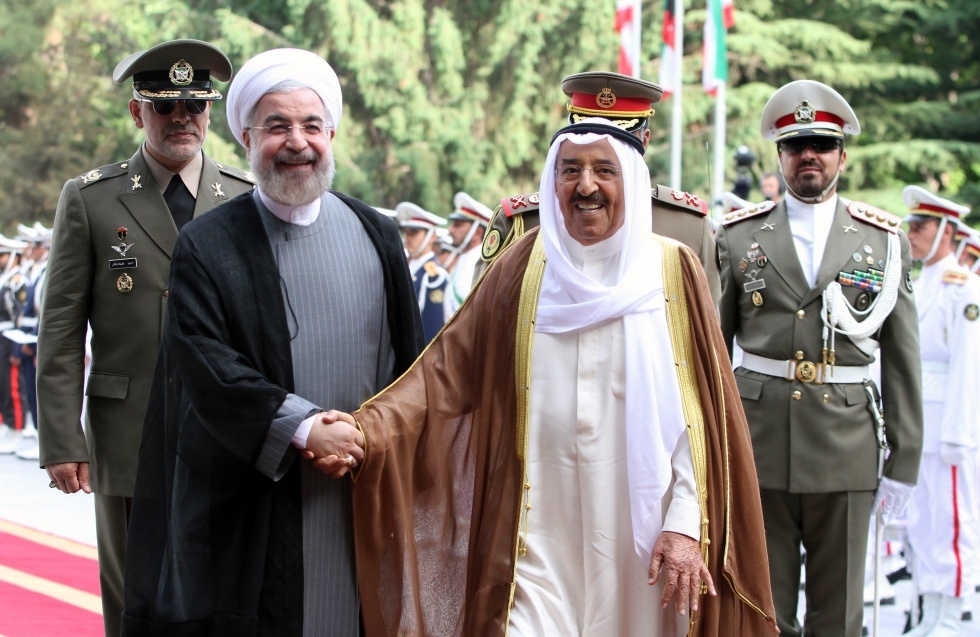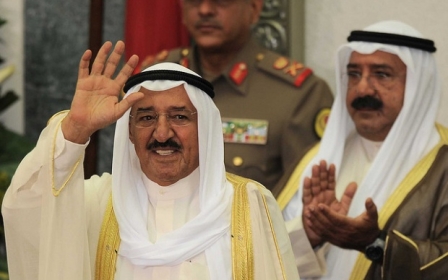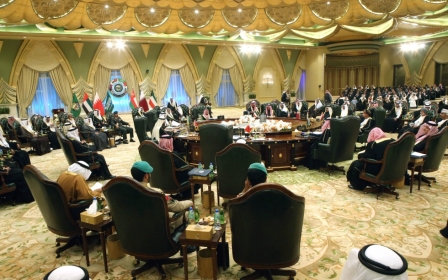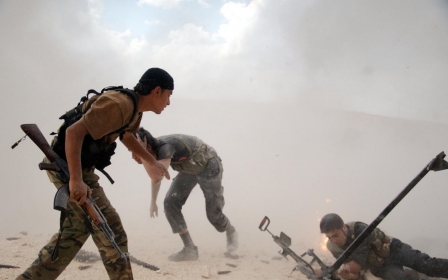Kuwait emir visits Iran in attempt to thaw GCC-Iran relations

Kuwait's Emir Sheikh Sabah al-Ahmad Al-Sabah on Sunday started a landmark visit to Tehran focused on mending fences between Shiite Iran and the Sunni-ruled monarchies in the Gulf.
The two-day visit comes amid a thaw in ties between Tehran and six-nation Gulf Cooperation Council (GCC) since the election of Iran's moderate President Hassan Rouhani in June 2013.
According to Al-Sharq Al-Awsat Newspaper, Iran and Kuwait have already signed six agreements since the arrival of the Kuwaiti Emir, including a security and trade deal.
In greeting the Emir, Rouhani, quoted on the presidency website, said the trip would mark "a decisive turning point" and that the two states had "close views on political, regional and international issues".
The visit would "benefit both countries", the emir was quoted as saying.
New MEE newsletter: Jerusalem Dispatch
Sign up to get the latest insights and analysis on Israel-Palestine, alongside Turkey Unpacked and other MEE newsletters
The emir is accompanied by a high-level delegation including First Deputy Prime Minister and Foreign Minister Sheikh Sabah Al-Khaled Al-Hamad Al-Sabah, Deputy Premier and Minister of Commerce and Industry Abdulmohsen Al-Madaj, Minister of Finance Anas Al-Saleh and Minister of Oil and Minister of State for National Assembly Affairs Ali Al-Omair.
"Our ties with Kuwait are very important to us and we hope this trip would be a new chapter to boost cooperation," said Iran's Foreign Minister Mohammad Javad Zarif, quoted by state news agency IRNA.
The visit will also focus on controversial regional issues, including Iran's military involvement in Syria, the situation in Iraq and Egypt, and the Middle East peace process, Kuwaiti officials said.
Relations between Iran and the Gulf, namely signs of rapprochement between regional power brokers Saudi Arabia and Iran, will also be discussed during the visit, Kuwaiti foreign ministry under-secretary Khaled al-Jarallah told Al-Hayat newspaper.
He said Kuwait, which currently holds the rotating presidency of the GCC -which also includes Bahrain, Oman, Qatar, Saudi Arabia and the United Arab Emirates (UAE) - has balanced links with Tehran and is willing to mediate between Riyadh and Tehran.
Saudi Arabia and its GCC partners are deeply suspicious of Iran's nuclear ambitions and wary of the talks under way between Tehran and Western powers aimed at striking a long-term compromise.
Riyadh is also at odds with Iran over the Syria war, in which Tehran backs the government and Saudi Arabia supports the rebels, as well as its involvement in Iraq, Bahrain and other countries in the region.
Last month, Saudi Foreign Minister Prince Saud al-Faisal invited his Iranian counterpart Zarif to visit Riyadh.
Saudi Arabia has also invited Iran to attend a two-day meeting of the Organisation of Islamic Cooperation that opens on 18 June in Jeddah, with Tehran welcoming the invite as a "friendly" gesture.
But Zarif told IRNA on Sunday that he will not be able to attend because the timing coincides with the next round of nuclear talks between Iran and world powers, scheduled for June 16-20 in Vienna.
In December, Zarif toured Kuwait, the UAE, Oman and Qatar, but skipped Bahrain and Saudi Arabia.
Kuwait's ambassador to Tehran, Majdi al-Dhafiri, told Kuwait's official news agency KUNA that Sheikh Sabah and Rouhani will discuss a number of "strategic projects" useful for the whole region.
Middle East Eye delivers independent and unrivalled coverage and analysis of the Middle East, North Africa and beyond. To learn more about republishing this content and the associated fees, please fill out this form. More about MEE can be found here.




